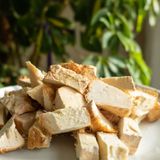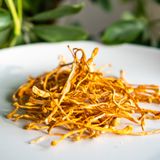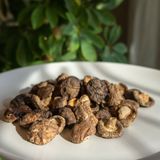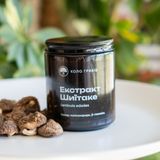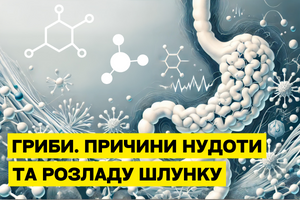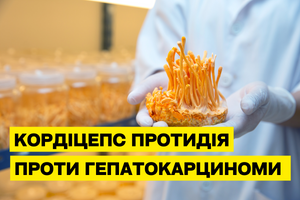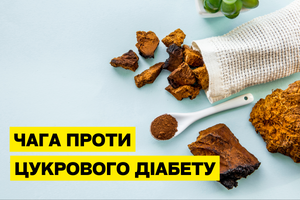Shiitake: Benefits and Uses
Research on the effects of the Shiitake mushroom (Lentinula edodes) on human health is of great significance in modern science. This species is one of the most well-known and is used as a model for studying functional properties and isolating pure compounds for pharmaceutical use. Shiitake mushrooms have high nutritional value and contain medicinal molecules such as polysaccharides, terpenoids, sterols, and lipids, which actively participate in various human diseases and modulate mechanisms of immune system regulation.
Shiitake has long been known for its medicinal properties, having been used for centuries in alternative medicine in Korea, China, Japan, and Eastern Russia. Numerous clinical studies on this topic are conducted in various scientific institutions in both the USA and European countries. One such study was conducted in Brazil at the Institute of Biotechnology, University of Caxias do Sul. The results of the study were published in the journal "Food and Nutrition Sciences" in June 2014.
In this study, the following active components were isolated from Shiitake:
Polysaccharides:
- β-glucans: Have immunomodulatory properties, activating macrophages, T-lymphocytes, and natural killer (NK) cells.
- Lentinan: Known for its antitumor activity and used in cancer treatment.
Terpenoids:
- Lentionine: Has antibacterial properties, effectively inhibiting bacterial activity.
Sterols:
- Ergosterol: Provitamin D2, which converts to vitamin D2 under ultraviolet light.
Organosulfur Compounds:
- Eritadenine: Lowers cholesterol levels in the blood.
Lipids:
- Phospholipids and other fats: Support overall body health.
These components of Shiitake demonstrate a wide range of biological activities, including immunomodulation, antitumor, antioxidant, antiviral, and antimicrobial actions.
Detailed Benefits of Shiitake
General Nutritional Composition Shiitake mushrooms have high nutritional value. They are rich in proteins, contain essential amino acids, and dietary fibers. These mushrooms have both soluble and insoluble fibers, as well as essential vitamins (B1, B2, B12, C, D, E) and minerals (iron, calcium, potassium, zinc). This makes Shiitake a valuable food product, especially for countries with high levels of food deficiency.
Immunomodulation and Antitumor Effects Shiitake can modulate the immune system, helping fight various diseases. Polysaccharides, such as β-glucans, activate macrophages, T-lymphocytes, and natural killer (NK) cells, which protect the body from bacteria, viruses, fungi, and parasites. Studies have shown that β-glucans help increase the levels of interleukins and tumor necrosis factor (TNF-α), aiding in the fight against tumors.
Antioxidant Properties Shiitake mushrooms contain biologically active compounds (β-glucans, phenolic compounds, ergosterol, selenium) that help reduce oxidative stress in the body. Antioxidants protect cells from damage caused by free radicals. This is important for maintaining health and preventing chronic diseases such as cardiovascular diseases and cancer.
Antiviral Properties Studies have shown that Shiitake extracts have antiviral activity against various viruses. Shiitake has shown activity against poliovirus type 1 (PV-1) and herpes virus. These viruses can cause serious diseases, such as poliomyelitis and herpes infections. The antiviral activity of Shiitake extracts helps reduce the infectivity of these viruses, preventing their spread and alleviating disease symptoms. Additionally, one of the key components of Shiitake with potent antiviral properties is the polysaccharide lentinan. Studies have shown that lentinan inhibits the activity of HIV-1 reverse transcriptase – an enzyme necessary for virus replication. This means that lentinan can reduce the virus's ability to reproduce in the body.
Antimicrobial Properties Shiitake has antibacterial activity that boosts the body's immunity against infections. Lentionine acts on bacteria by inhibiting specific enzymes and proteins needed for their growth and reproduction. This can disrupt the metabolic processes of bacteria, leading to their death. Lentionine has shown antimicrobial activity against bacteria such as Staphylococcus aureus, Bacillus subtilis, Escherichia coli, and other potentially harmful bacteria.
Hypoglycemic and Hepatoprotective Properties Shiitake is also known for its hypoglycemic properties, reducing blood glucose levels, increasing insulin secretion, and improving insulin sensitivity. It delays the breakdown of glycogen (a form of stored glucose in the liver) in rats with induced diabetes. Additionally, Shiitake mushrooms have hepatoprotective properties, meaning they can protect the liver from damage and aid in its recovery by lowering levels of aspartate aminotransferase and alanine aminotransferase in the blood (enzymes usually found in liver cells; high levels of these enzymes can indicate liver disease or damage such as hepatitis, cirrhosis, or alcohol-related liver damage).
As we see from the research, Shiitake mushrooms have high therapeutic potential. They contain various nutrients and biologically active compounds that help in fighting chronic diseases such as cancer and cardiovascular diseases, as well as combating viruses and microbes. Regular consumption of Shiitake can positively impact health by improving the immune system, reducing the risk of developing chronic diseases, and alleviating their progression if they are already present.
If you seek to improve your health naturally, Shiitake mushrooms are worth considering. Visit our store and start changing your life for the better today!
For each client individually, we draw up instructions according to his indicators and requests
Monthly Course:
- Shiitake whole 100 g - $19
- Extract of Shiitake 90 capsules - $46
Other articles on the topic:
- What is the difference between dried mushroom and extract?
- What are beta-glucans?
- What are polysaccharides?
Contact us:






